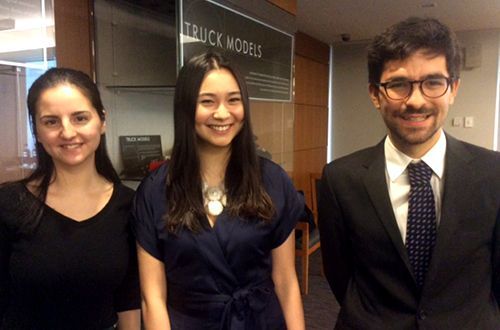Three US students win Okinawa Essay Contest

Winners of the Okinawa Essay Contest, from left: Nina Udagawa, Christine Mari Inzer, Hilson Reidpath.
April 28, 2019 Rykyu Shimpo
By Tamiko Suzuki
The Okinawa Prefectural Government and the George Washington University Okinawa Collection held an awards ceremony at the university’s Gelman Library in D.C. on March 19 to recognize the Okinawa Essay Contest winners.
The contest invited undergraduate and graduate students from the District of Columbia, Maryland, Virginia, and Hawaii to submit academic research essays on Okinawa, of which three winning essays were selected. Each winner presented their essay at the awards ceremony.
First place was awarded to Hilson Reidpath, a doctorate student at the University of Hawai’i, whose essay examined Okinawan poet Baku Yamanokuchi’s identity struggle through the poet’s work.
The essay also points out stereotyping and discrimination of Okinawans by mainland Japanese.
Second place went to Christine Mari Inzer, a graduate of the University of Richmond.
Her essay, “Contesting Japanese Post-War Memory in Modern Okinawan Literature,” presents the view that postwar Okinawa still remains oppressed, through the works of Okinawan writers including Tatsuhiro Ōshiro.
Third place was awarded to Nina Udagawa from George Washington University, who investigated the circumstances Amerasians encountered in Okinawa.
The essay researched the process of overcoming identity crises and finding self-affirmation.
The three winners were awarded cash prizes, and will be invited to travel to Okinawa this summer.
Okinawa Prefectural Government Washington D.C. Office Chief Osamu Unten said, “The contest aims to raise awareness of Okinawa’s various issues through research on Okinawan culture, economics, history, politics and society.
We hope to facilitate discussions between the young generation of Okinawa and the U.S., to deepen appreciation of each other and build a good relationship.”
(English translation by T&CT and Monica Shingaki)
Previous Article:Okinawa attracts almost 10 million tourists to the region, including over 3 million from abroad, breaking their record for the 6th straight year
Next Article:Battle of Okinawa survivors speak of mixed feelings about the emperor system, memories of war, and the emperor’s visits to Okinawa (Heisei and Okinawa)
[Similar Articles]
- Gov. Onaga Attends Opening Ceremony of Okinawa Collection at Washington University
- “Don’t give up hope” teen leukemia survivor wins essay contests sharing her battle
- Three winners of Miss Okinawa 2014
- Three winners of Miss Okinawa 2015
- Meio University students win top essay prize at tertiary education conference in Hanoi
 Webcam(Kokusai Street)
Webcam(Kokusai Street)


